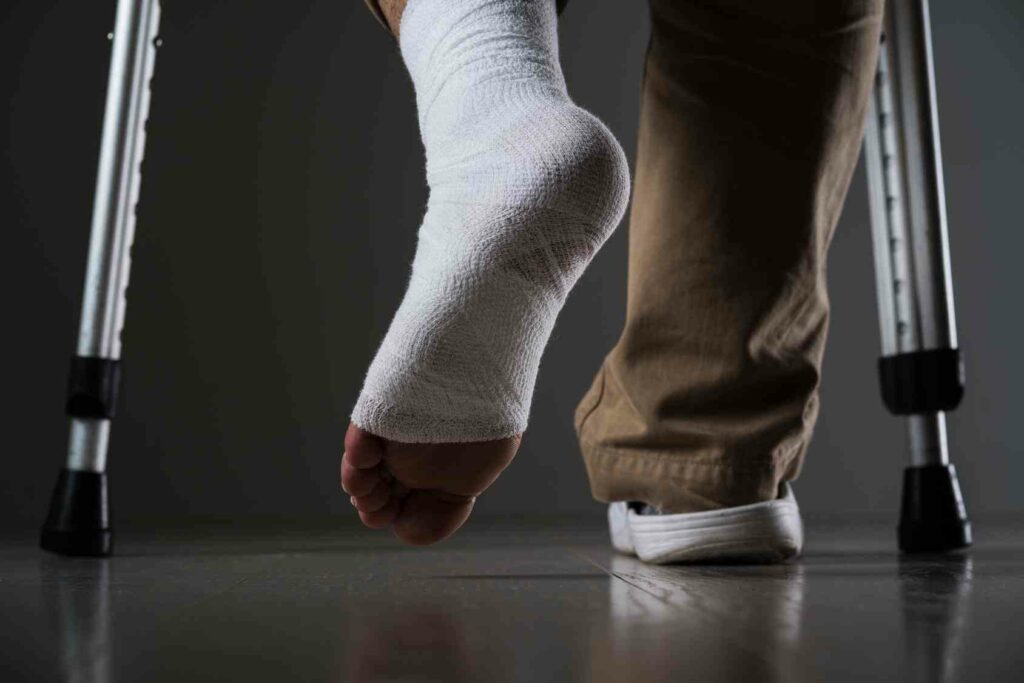Motor vehicle accidents are a leading cause of death and injury in the United States. Every year, tens of thousands of people are killed or injured in crashes involving cars, trucks, motorcycles, and other vehicles. If you or someone you love has been injured in a motor vehicle accident, it is important to understand the different types of injuries that can occur. This blog post will discuss the three most common types of MVA injuries: blunt force trauma, whiplash, and concussions. We will also explore the causes and treatments for these injuries.
Contents
What Is MVA Injury?
The full form of MVA is “motor vehicle accident.” MVA injuries are those that occur as a result of a motor vehicle collision. These injuries can be minor, major, or even fatal. MVA injuries can occur to the driver, passengers, pedestrians, or bicyclists involved in the accident. MVA injuries can range from cuts and bruises to broken bones and internal bleeding. In some cases, MVA injuries can lead to long-term disabilities or even death.
What Are The Different Types Of MVA Injuries?
An injury can be mild, moderate, or severe. It can also be a sprain, strain, fracture, dislocation, or concussion. There are different degrees of injuries like blunt force trauma, whiplash and concussion. let us discuss these:
Blunt Force Trauma
Blunt force trauma is an injury caused by a direct blow to the body. It can cause bruising, swelling, and internal damage. Fractures occur when bones break or crack due to excessive force being applied. Dislocations also happen when too much pressure is put on a joint and it becomes misaligned. Sprains are injuries that occur when ligaments or tendons are stretched beyond their normal range of motion. Strains are similar to sprains, but they involve the muscles instead of ligaments and tendons.
Whiplash
Whiplash is an injury that occurs as a result of sudden acceleration and deceleration forces on the neck. This can cause soft tissue damage in the neck area, as well as strain and irritation of the muscles.
Concussion
A concussion is a type of traumatic brain injury caused by a blow to the head or body. Symptoms can include confusion, dizziness, headache, memory problems, nausea, and vomiting.
It is important to seek medical attention for any type of MVA injury. Depending on the severity of the injury, treatment may include rest, physical therapy, or surgery. Early detection and treatment can help reduce complications and long-term effects of MVA injuries.
What Are The Most Common Injuries In A Car Accident?
 Car accidents can be caused due to a variety of reasons such as human error, mechanical failure, and adverse weather conditions. However, one of the most common causes of car accidents is distracted driving. According to the National Highway Traffic Safety Administration (NHTSA), there were 3,166 people killed in car accidents involving distracted drivers in 2017 alone.
Car accidents can be caused due to a variety of reasons such as human error, mechanical failure, and adverse weather conditions. However, one of the most common causes of car accidents is distracted driving. According to the National Highway Traffic Safety Administration (NHTSA), there were 3,166 people killed in car accidents involving distracted drivers in 2017 alone.
No two car accidents are alike and therefore, no two injuries sustained in a car accident are alike either. The type and severity of injuries that a person sustains in a car accident will depend on many factors, such as the speed of the vehicles involved, the type of collision, and whether or not the person was wearing a seatbelt.
Some of the most common injuries that can occur in car accidents include:
Whiplash
This is a neck injury caused by the sudden jerking motion of the head, typically in a rear-end collision. Symptoms can include neck pain, stiffness, headaches, and dizziness. whiplash can be mild or severe, and may require physical therapy or other treatment.
Fractures
 A fracture is a break in the bone. fractures can occur in any bone in the body but are most common in the arm or leg bones. symptoms of a fracture include pain, swelling, bruising, and difficulty moving the affected limb. Treatment depends on the severity of the fracture but may involve surgery, a cast, or a splint.
A fracture is a break in the bone. fractures can occur in any bone in the body but are most common in the arm or leg bones. symptoms of a fracture include pain, swelling, bruising, and difficulty moving the affected limb. Treatment depends on the severity of the fracture but may involve surgery, a cast, or a splint.
Internal Injuries
These are injuries to the organs inside the body, such as the lungs, heart, or liver. Internal injuries can be very serious and may require hospitalization. Symptoms of internal injuries include pain in the abdomen or chest, shortness of breath, and dizziness.
Soft Tissue Injuries
These are injuries to the muscles, ligaments, or tendons. Soft tissue injuries can be caused by the impact of the accident or by being thrown from the vehicle. Symptoms include pain, swelling, and bruising. Treatment may involve ice, heat, rest, and physical therapy.
Head Injuries
Head injuries range from minor cuts and bruises to more serious injuries, such as concussions or brain damage. These can be very serious and may require hospitalization. Symptoms of a head injury include headache, dizziness, nausea, and vomiting. Treatment depends on the severity of the injury, but may involve rest, ice, and medication.
If you have been injured in a car accident, it is important to seek medical attention right away. These injuries can be serious and even life-threatening. If you have been injured in a car accident, contact an experienced personal injury lawyer to help you with your claim.
How Do You Know If An MVA Injury Is Serious?
After an MVA, it is important to seek medical attention even if you feel fine. Many injuries do not cause immediate pain or problems but can turn into serious conditions later on. It is especially important to see a doctor if you experienced any of the following signs:
- Headache
- Dizziness or lightheadedness
- Numbness or tingling in the extremities
- Persistent neck pain
- Upper back pain
- Loss of consciousness
Ignoring these symptoms can lead to more serious problems down the road. If you are involved in an MVA, the best thing to do is to see a doctor as soon as possible.
What Are The Types Of Treatment For MVA Injury?

There are many types of treatments available for MVA injuries. Depending on the severity of the injury, treatments may include:
Physical Therapy
Physical therapy is one of the most common treatments for MVA injuries. It helps to improve the range of motion, flexibility, and strength. Since it’s a non-intrusive treatment, hence there is no pain.
Pain Medication
Medications are often prescribed to help relieve pain associated with MVA injuries. Commonly prescribed medications include over-the-counter pain relievers, such as acetaminophen or ibuprofen. In some cases, prescription pain medication may be necessary.
Surgery For Severe MVA Injury
In the case of MVA, surgery is usually required to correct the damage caused by the accident. Surgery may be done to repair bones, tendons, or ligaments. In situations that are severe, surgery may be required to fuse bones together.
Massage Therapy
Massage therapy for MVA is advised when there is soft tissue damage. It helps to improve blood circulation, which in turn speeds up the healing process. Massages will help you feel less pain and stiffness.
Acupuncture
Acupuncture is another ancient healing treatment that’s often used to treat MVA injuries. This treatment involves the insertion of thin needles into the skin at specific points. Acupuncture is said to help relieve pain and promote healing.
Chiropractic Care
Chiropractic care is often recommended for MVA patients. Chiropractors use spinal manipulation and other techniques to realign the spine and improve function. This, in turn, helps to reduce pain.
Yoga
Yoga is an excellent way to stretch and strengthen the muscles. It also helps to improve flexibility. These are all important factors in the healing process of MVA injuries.
Reiki
Reiki is a Japanese healing technique that’s based on the principle of energy flow. This therapy involves the placement of hands on the injured area to promote healing. Reiki is said to help reduce pain, speed up the healing process, and promote relaxation.
Psychological Counseling
Counselling is often recommended for MVA patients. Counselling can help to deal with the emotional and mental stress that’s often associated with MVA injuries.
Support Groups
Support groups provide an excellent way to connect with others who are dealing with similar injuries. In a support group, you can share your experiences and learn from others. This can be a great way to find support and encouragement.
MVA injuries can be extremely painful and debilitating. However, there are many treatment options available that can help you heal and get back to your normal life. Be sure to discuss all of your treatment options with your doctor to determine which ones are best for you.
Conclusion
In conclusion, MVA (Motor Vehicle Accident) injury is a type of personal injury that can occur as a result of a car accident, motorcycle accident, or other motor vehicle accident. MVA injuries can be caused by a number of factors, including driver error, poor road conditions, and mechanical failure. Treatment for MVA injuries may vary depending on the severity of the injury but may include medical treatment, physical therapy, and/or surgery. Physical therapy is the best non-intrusive option for cure. Thanks for reading!
Physical Therapy help patients recover from pain. If you’re experiencing Back pain, Shoulder pain, Knee pain, Neck pain, Elbow pain, Hip pain, or Arthritis pain, a physical therapist at MantraCare can help: Book a physiotherapy session.


